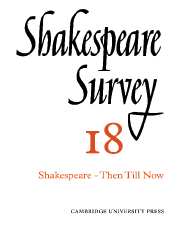Book contents
- Frontmatter
- Chiding the Plays: Then till Now
- ‘The Great Variety of Readers’
- Shakespeare’s Text—Then, Now and Tomorrow
- ‘Hamlet’ Then Till Now
- Shakespeare’s Imagery—Then and Now
- The Study and Practice of Shakespeare Production
- Shakespeare on the Screen
- Shakespeare in the Opera House
- Some Shakespearian Music, 1660–1900
- Shakespeare in America: A Survey to 1900
- International Notes
- Shakespeare Productions in the United Kingdom: 1962–4
- Three Kinds of Shakespeare: 1964 Productions at London, Stratford-upon-Avon and Edinburgh
- The Year's Contributions to Shakespearian Study 1 Critical Studies
- 2 Shakespeare’s Life, Times and Stage
- 3 Textual Studies
- Books Received
- Index
- Plate section
Shakespeare in the Opera House
Published online by Cambridge University Press: 28 March 2007
- Frontmatter
- Chiding the Plays: Then till Now
- ‘The Great Variety of Readers’
- Shakespeare’s Text—Then, Now and Tomorrow
- ‘Hamlet’ Then Till Now
- Shakespeare’s Imagery—Then and Now
- The Study and Practice of Shakespeare Production
- Shakespeare on the Screen
- Shakespeare in the Opera House
- Some Shakespearian Music, 1660–1900
- Shakespeare in America: A Survey to 1900
- International Notes
- Shakespeare Productions in the United Kingdom: 1962–4
- Three Kinds of Shakespeare: 1964 Productions at London, Stratford-upon-Avon and Edinburgh
- The Year's Contributions to Shakespearian Study 1 Critical Studies
- 2 Shakespeare’s Life, Times and Stage
- 3 Textual Studies
- Books Received
- Index
- Plate section
Summary
There have been so many operas founded on Shakespeare's plays - I know of nearly 200 - and the question of what constitutes a good opera, and why, raises so many complex considerations, that I cannot hope to do much more than scratch the surface of the subject. Admittedly the average artistic level is not high. With the exception of a few masterpieces, which can be counted on the fingers of one hand, and a scarcely larger group, mostly based on the comedies, that are good for an occasional airing, you are never likely to hear them in performance. Any interest they possess is historical, and it concerns the history of opera rather than of Shakespeare. Sometimes too they have a certain entertainment value of a type not envisaged by their authors.
The scarcity of masterpieces is hardly surprising. A great opera, depending on a balance between several arts-music, drama, scenery, spectacle, ballet-of which the two most important, music and drama, are notoriously unaccommodating bedfellows, is rare in any circumstances. When one half of the partnership is based on a literary classic, the chances are slenderer still. It is not just a matter of the librettist being faithful to the play and the composer writing agreeable music. A whole series of compromises is necessary if the different time-scales imposed by music and the spoken word are to be reconciled; and the opera, if it is to be worthy of the occasion, must not only rise to the play, musically and dramatically: it must add something of its own. Otherwise there is no point in its existence.
- Type
- Chapter
- Information
- Shakespeare Survey , pp. 75 - 93Publisher: Cambridge University PressPrint publication year: 1965
- 1
- Cited by

